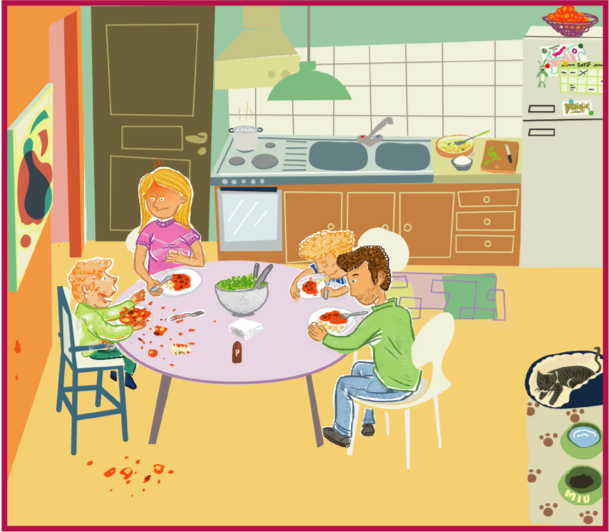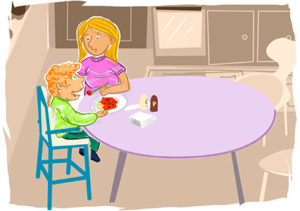
Your son Sam is 1,5 years old. Now he wants to eat on his own. But instead of using his spoon and fork properly, Sam plays with the food and fails to put the food into his mouth. Food is everywhere: on his clothes, hair and on the floor around the table. You get angry because you think about the mess and what it will take to clean up the kitchen.
Every parent is familiar with such situations from daily life with little ones. How can we react adequately to avoid conflicts and bad emotions in such situations?
Following you can analyze the situation and your reactions with the help of initial questions.
Additionally you find some hints to react adequately.
What should I know about communicating with babies and toddlers?
All kinds of communications affect the brain of a child, and language is essential for a good development of your child‘s brain. The lack of communication in early childhood leads to poor vocabulary development with negative consequences for a child‘s intelligence and learning success for life. Our brain creates a network of neurons, using all new inputs coming from the environment. Through social actions, such as verbal and non-verbal communication, repeating and deepening of stimuli, we help our brain to strengthen and grow this invaluable network.
Thus, as parents you have great influence over your child’s intelligence, and social and individual development.
How can you best promote the development of your child’s brain?
It is very important to communicate at every opportunity with your child, even at an early age. However, for the development of the child‘s brain it is not only important how often you talk, but also how you communicate with the toddler. Scientists have developed some basic suggestions (the three T’s) for you to consider.
The three Ts:
Tune In: This means you have to put yourself in the position of the toddler. Observe your child: What is he/she interested in at the moment? What does he/she focus on? Talk to your toddler about it (e.g. pegs, cups or bowls, textiles, stones, mirrors, animals, other children, emotions or observations) even if he/she is not able to understand your words just yet. Sometimes little children will change their focus really fast. The book might no longer be interesting for the child after one minute, but he/she may suddenly show a great interest in the toy blocks at the other side of the room. Let your children go for it and provide comments for their actions! Adopting the perspective of a child and making comments about it supports the child’s learning and brain development. The child doesn’t have to waste energy with uninteresting stuff imposed by the parents.
Talk More: This advice is really easy to integrate into your daily life with little ones. Comment all of your actions with the baby: feeding, changing diapers, dressing, bathing. Your child will remember the different sounds of your language and after a while will reproduce them. Examples:
- Explain the object that your toddler holds in his/her hands: What is it? What do we use it for?
- Together look for other or similar objects: Where can we find new ones? Where are they hidden?
- Ask questions: When your child stretches out his/her arms for you, first ask: „Do you want to come here to me?“ and then act and take your child. This way your child can make the connection between sentence and action.
When your toddlers begin to vocalize words (like „ball“), extend their uttered words to a full sentence like „Yes, there is a ball.“ or „Do you want to play with the ball?“ In so doing, or when using the words in a different context, you encourage your child to communicate. This also creates the desire to use language.
Take Turns: While communicating with your child make sure you allow for reciprocity. Let the child find the words on his/her own, do not anticipate them and say them in advance. Toddlers need a certain time to find the right and adequate words in the early phase of learning a language.
Use open questions, like: why, who, how? Children have to use more words to answer these questions, so they practice their vocabulary with every answer. Moreover, these questions support persistent communication. Thus, your conversation will not end after a one-word answer to a yes-no question.
„Talking with kids about eating habits” is based on the following references:
Nolan, Virginia. 2016. «Die Macht der Sprache.» Das Schweizer Elternmagazin Fritz und Fränzi, Oktober, 58-64.
Suskind, Dana, Beth Suskind und Leslie Lewinter-Suskind. 2015. Thirty Million Words. Building a Child’s Brain. New York: Dutton.



